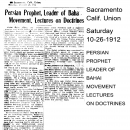Main menu
- ‘Abdu’l-Bahá’s Journey
- World Peace
- Stopping Racism in America
- Empowerment of Women
- More Principles...
- Prayer for America
Persian Prophet, Leader of Bahá Movement, Lectures on Doctrines
‘Abdu’l-Bahá Abbas, the Persian prophet and world leader of the Bahá’í movement, last night at the Hotel Sacramento expounded the doctrine and principles of his cause to an audience of mixed nationalities. Universal brotherhood, international peace, religious unity and the establishment of an ultimate world tribunal of arbitration make up the chief foundations for the movement which already has 12,000,000 followers in the world.
The venerable prophet, with his long gray beard, cloak and turban, spoke in Persian. His remarks were translated by Dr. Ameen Fareed, a graduate of the University of Illinois, and also of Johns Hopkins university. In appearance he represented a true incarnation of the far Eastern patriarchs and prophets of old.
ON TOUR OF UNITED STATES.
‘Abdu’l-Bahá’s home is in Mount Carmel, Syria. He arrived in New York April 7, 1912, and is touring the United States. This is his first visit to this country. To a Union reporter, in his apartment at the Hotel Sacramento yesterday afternoon following his arrival from San Francisco, he grave a brief synopsis of what the Bahá’í movement really stands for.
Universal peace is possible, he claims, only through the harmonizing of religious differences among races and nations. Jews, Christians, Mohammedans, Hindus and believers of all Divine religions, he declares, if they go back to the fundamental principles of their respective religions will find a common meeting ground. All religion, he asserts, after a lapse of centuries have been corrupted by dogmas.
EXPOUNDS PRINCIPLES.
Summarizing the Bahá’í idea he dictated the following statement, declaring its purpose to be: To invetsigate reality or truth; the declaration concerning the oneness or solidity of human kind, meaning God is one and humanity is one; international peace among races, among nations and among religions; the comparison of religion with science with a view of conforming the two; the general spread of education; international language as a means of international communication; the adoption of the Bahá’í formula for a definite regime of economics, which although it conserves the social degrees makes it possible for each individual to enjoy fully the resources of the Creator; the equality of rights, spiritual solidity and, heavenly fraternity; the establishment of an international parliamentary tribunal to which all nations shall send authorized representatives to settle by arbitration international disputes.
‘Abdu’l-Bahá’s party is composed of four other Persians and a Japanese fugitive [should read “Fujita”]. In the party are Dr. Ameen Fareed, Mirzra Ahmad Sahrab, Mizra Mahmood, and Mirza Ali Abkar.
‘Abdu’l-Bahá is 68 years old. He is the third of a trinity of Bahá’í prophets. Until the Young Turks assumed control of the Turkish empire ‘Abdu’l-Bahá was a prisoner. At the age of 9 he was sentenced to prison for life by the former Sultan of Turkey, ‘Abdul Hamid.
The Bahá’í religion was conceived by Bahá’u’lláh about 50 years ago. This prophet communicated his ideas to every ruler of the world at the time. U.S. Grant, as President of the United States, received a copy of the prophet’s doctrine for universal peace.
BARS AMERICAN POLITICS.
With regard to the Balkan war, ‘Abdu’l-Bahá merely pronounced it the result of a ferocious state of affairs. He did not care to discuss American politics, although he declared himself interested in the outcome of the coming election.
A few days ago ‘Abdu’l-Bahá spoke to the students of Stanford university. He is now on his way to Salt Lake. On his return trip across the continent he will speak in Salt Lake, Denver, Omaha, Chicago, Des Moines, and other larger cities of the middle West and East. He will repeat his lecture at the hotel this morning at 9 o’clock. He will leave Sacramento today to continue his journey East.









